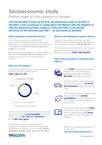We opened the first Lidl stores in Slovakia in September 2004. Since then we have come a long way together with our employees and customers. Lidl has become a leader in food retail, but few people realise that our business also has a significant positive impact on the national economy. We are among the largest employers, taxpayers and investors in Slovakia. We operate in more than 90 cities across the country and cooperate with suppliers from all regions.
Tomáš Bezák Head of Corporate Communications at Lidl Slovakia
Our expectation associated with the socioeconomic study was to identify and quantify these positive impacts during one business year. These are exactly the results we have been provided with.
According to McKinsey & Company, yet there is little clarity or consensus about how the business activities of companies impact the economy and society. Nevertheless, several studies on this topic have already been prepared and communicated to wider audience. In recent years, there has been a growing recognition of the need to evaluate the value added by businesses to the society.
Different actors use a wide variety of socioeconomic impact assessment approaches. Despite this diversity, two main types of approaches can be distinguished. The social outcomes approach focuses on the positive social outcomes of organizations (rather than financial benefits). Such approach sees positive social impact as a delivered benefit. The business value approach quantifies induced positive financial effects. Unfortunately, mutually agreed impact assessment standards are currently lacking. Different organisations use diverse methods and techniques to measure and track impact.
There are several reasons why added value derivation represents a very complex and complicated exercise. Typically, the main effects of socioeconomic impacts are difficult to quantify, assessments occur outside the organization, complicating control efforts and it is required to recognize various externalities in this exercise. In this article, we would like to mention studies by McKinsey & Company and Mazars in Slovakia with pioneer estimations of added value delivered by businesses.
McKinsey & Company identified pathways through which economic value from corporations flows to households and the economy through value flow streams. The directly measured pathways are:
- Labour income (wages and benefits)
- Capital income
- Taxes
- Investment in capital assets
- Payments to suppliers
Study broadly estimated consumer surplus (the difference between what consumers are ready to pay and what they do pay) of 40 cents per 1 USD of corporate revenue. This estimated value is interpreted as added value for consumers thanks to price reductions (e.g. caused by technical improvements).
In 2022 Mazars socioeconomic study for Lidl Slovakia, we measured value directly distributed into Slovak economy on a cash basis through:
- Purchases
- Paid tax duties
- Human capital expenditures
- Energy consumption
- Legal expenses
- PR costs
- Payments related to circular economy duties
We also categorized these flows into Slovak economy according to the type of recipient: flows to employees, private sector, cities, state, and NGOs. Besides directly measured values, we estimated induced value for Slovak economy being at the level of 58 cents per 1 EUR of directly measured economic value distributed into economy by Lidl Slovakia. The estimation was calculated using Leontief model. A similar socioeconomic study utilizing Leontief model was published by Lidl Poland in 2021. In Poland, according to estimations, Lidl generates induced value of 29 grosz per 1 PLN of real economic value distributed to economy.
In the socioeconomic study by Mazars in Slovakia, we also discuss differences between effects arising from direct state support money flows into least developed regions and economic inflows realized through vital business network Lidl has created over the years in those least developed regions. We invite you to have a glance at the one-pager summarizing the key findings of the above-mentioned study by Mazars.
All in all, we foresee a further potential of similar socioeconomic studies in various economic sectors to better recognize added value delivered thanks to operation of businesses with well-established relationships with stakeholders at state or regional levels.








